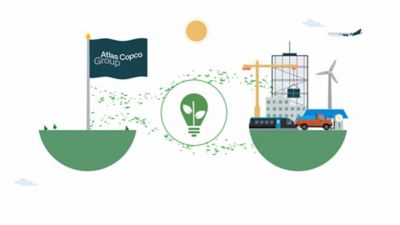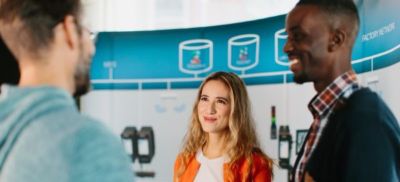Meet Isabelle De Wolf, Manager of Engineering in the Medical Gas Solutions division
Isabelle De Wolf, Manager of Engineering in the Medical Gas Solutions division, got the mission to set up Atlas Copco’s first in-house filtration expertise team in 2007. Since then, this has grown into an R&D center that puts the company at the forefront of filtration and separation technology.
When a compressor sucks in air to compress it, unwanted particles are part of the mix. It can be dust, dirt or other aerosols, or oil from the machine itself. Removing these contaminants is crucial, especially when making sensitive products like food, beverages, electronics and pharmaceuticals. Contaminants can over time also damage the process equipment, for example due to corrosion, resulting in quality and performance loss. A good filter can in other words make or break an entire production process. The filter quality also impacts the overall energy consumption.
Filters must also be replaced regularly, and the customer need is constant. We are now one of the top players in the air treatment and filtration field, but this was not always so.
“Atlas Copco moved into air treatment in the nineties when we acquired a company in this field,” says Isabelle. “This taught us a lot, but much of the product development relied on external suppliers for testing and this kept us from fully leveraging our R&D investments. In 2007, I was assigned to set up an inhouse filtration competence center that would support the entire Compressor Technique business area. It was part of the company’s strategy to grow this business, and our assignment was right from start to focus on top level quality, performance and energy efficiency. After a few years, product development became part of our responsibility as well.”
A growing in-house department
What started out as a team of four with Isabelle and three young engineers is now a department of 20 people with different skills and expertise, and a state-of-the-art lab where they can expose filters to different aerosols, vapors and particles.
“By focusing on one research area at the time, we have developed and finetuned our methods and learned how to use the data to drive our innovation. It’s been an amazing experience, and one of the things I really appreciate about working here. You get a mission and the freedom to fulfill it, but also the support you need,” says Isabelle.
A key success factor has been bringing R&D and product development together in the same team, interacting in the lab. The innovation process often starts in R&D, but product marketing can also initiate the innovation process by capturing ideas from customers and bringing them to R&D. Sustainability is a big focus in the department, mainly on energy consumption. The challenge is to achieve the same level of air purity on less energy. “We have so far managed to drop energy consumption by 65% since 2012. It’s a question of designing the filters in the most efficient way, combining technologies, and looking at new materials. Another aspect of CO₂ reduction is to possibly recycle or reuse our cartridges.”
The team still collaborates with leading universities and researchers to gather hard data and groundbreaking insights. “Universities observe things we are not aware of, and once you have learned to interpret the data you can use it to improve your product development. We have learned how to translate theoretical research into potential customer benefits. This is very intellectually challenging but also very rewarding,” says Isabelle.
Innovation at its best
A project Isabelle is very proud of is the new generation of the filter portfolio, “The InPASS”, which was successfully launched earlier this year. “This has been a very long and ambitious project and we are now proud to present it to the world. The new product range has completely new features that none of our competitors offers. Innovating on this level is a real treat,” Isabelle concludes.





